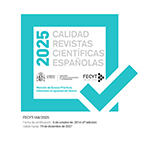De hachas vs. bisturies en la investigación social Cómo se hizo “La vida cotidiana en las nuevas familias”
Resumen
El título obedece a una frase que acuñé para mis alumnos: “en Ciencias Sociales trabajamos con hachas, no con bisturíes”. Aludo a que la realidad social no es susceptible de los cortes precisos del bisturí sino de los bastos del hacha. No se debe a incapacidad de desarrollar técnicas y metodologías de precisión sino a la naturaleza específica de las/os actores sociales. A diferencia de las rocas, nos modificamos con cada medición; nos preocupa más dar una buena imagen de nosotros mismos que ser tan veraces como esperan nuestros entrevistadores; nuestras opiniones y actitudes son porosas a la presión social. Medir “con dos decimales” (bisturíes) crea una ilusión de precisión que no soporta la realidad social, la validez de cuyo conocimiento surge de que mediciones varias (con hachas), provenientes de variados tipos de datos, técnicas y perspectivas temporales, marchen en la misma dirección. En este artículo muestro cómo investigo desde el presupuesto expuesto. Lo hago a partir de una investigación resultado de casi una década de estudiar las interacciones entre las transformaciones por género (feminización) del mercado laboral y las transformaciones de la familia en la Argentina desde el inicio de los 80. Mi pregunta es: ¿hasta qué punto la expansión de la participación de las mujeres en el mercado de trabajo fue acompañada por una equivalente de los varones en el hogar, en el cuidado de la casa y de los hijos? Para abordarla triangulé datos estadísticos con datos de entrevistas con miembros de 200 familias actuales de uno y de dos proveedores, de sectores medios y bajos, con datos de la generación anterior informados por miembros de las 200 familias actuales (“cronistas”) sobre sus hogares de origen, y por miembros de 42 familias formadas en la generación anterior (“protagonistas”), además de 35 familias equivalentes entrevistadas siete años antes.Descargas
Descarga artículo
Licencia
La revista Política y Sociedad, para fomentar el intercambio global del conocimiento, facilita el acceso sin restricciones a sus contenidos desde el momento de su publicación en la presente edición electrónica, y por eso es una revista de acceso abierto. Los originales publicados en esta revista son propiedad de la Universidad Complutense de Madrid y es obligatorio citar su procedencia en cualquier reproducción total o parcial. Todos los contenidos se distribuyen bajo una licencia de uso y distribución Creative Commons Reconocimiento 4.0 (CC BY 4.0). Esta circunstancia ha de hacerse constar expresamente de esta forma cuando sea necesario. Puede consultar la versión informativa y el texto legal de la licencia.











